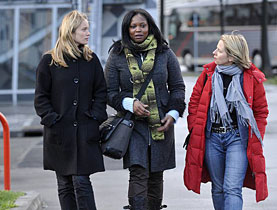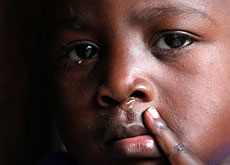New hotline for trafficking victims

Campaigners have launched a special telephone hotline in Geneva for victims of human trafficking, the third-largest criminal activity worldwide.
Every year there are up to 3,000 victims of trafficking in Switzerland, a five-fold increase in five years, with the majority involved in enforced prostitution, according to the authorities.
Although figures on human trafficking are piecemeal, the US Department of State, which publishes an annual trafficking report, estimates that 800,000 people are trafficked across international borders annually. Eighty per cent of these are female and half are children, but this does not include millions trafficked within their own countries.
Switzerland is a destination and to a lesser extent a transit country for women trafficked mainly from eastern Europe, Brazil, the Dominican Republic and Africa, who are forced into prostitution. Limited cases of domestic servitude and labour exploitation are also reported.
“I was subjected to an indescribable humiliation – an abuse both physical and mental,” explained Halimatou, a young woman from West Africa at the Au Coeur des Grottes victim centre in Geneva.
Halimatou left Africa for Italy with a “friend” three years ago with the idea of getting married. But she ended up staying with a group of “friends” in Geneva who took her passport and forced her into prostitution.
Anne Marie von Arx-Vernon, deputy director of the centre, which has supported some 50 women in similar situations to Halimatou over the past 12 years, told swissinfo this was just the tip of the iceberg.
“Most of these people are held hostage in apartments and don’t work in cabarets or massage parlours. After a while they can’t stand it any longer and somehow manage to escape,” she said. “The first thing they say when they arrive at the centre is ‘I didn’t know I could get help’.”
Victim-focused
The hotline, launched on Tuesday by two Geneva-based non-governmental organisations, End Human Trafficking Now! and Friends of Humanity, will allow more victims who dare not call the police to come forward to obtain confidential support without fearing expulsion.
A similar hotline run by the Swiss-German non-governmental organisation FIZ exists in Zurich.
“The hotline is very victim-focused and will also allow us to better assess the problem in Geneva,” programme director Ivana Schellongova from End Human Trafficking Now! told swissinfo.
“People can call a number that will allow them to explain their identity and be offered various existing services – it’s up to the victim to decide the follow-up,” she explained.
Although legal instruments – both national and international – exist to combat trafficking, the victims don’t realise that they themselves can receive assistance, she added.
Greater protection
According to the Federal Police Office, Switzerland invests between SFr2-3 million ($1.9-2.8 million) on human trafficking prevention and protection campaigns in the countries of origin.
But legislation to combat trafficking and victim support needs to be stepped up in Switzerland, said Schellongova.
“Legal provisions concerning victim assistance need to be strengthened and brought in line with the Council of Europe Convention of Action Against Trafficking,” she said.
The convention, which was launched in 2005, commits signatory countries to protect victims of all forms of exploitation and to implement measures to safeguard their rights.
The agreement is designed to give victims time to recover from their ordeal and to decide whether they will help police prosecute traffickers. It includes giving victims periods of automatic stay in the country once they escape.
In Switzerland, as a result of measures against illegal immigration, many victims of forced prostitution are criminalised as illegal immigrants and deported, according to the Swiss Information Centre for Women.
The Swiss women’s organisation Terre des Femmes is demanding that victims of human trafficking and forced prostitution be allowed to remain in Switzerland in every case. Until now this has only been possible if the victims are prepared to give evidence in court – something most are too scared to do.
Von Arx-Vernon said the Geneva centre was extremely transparent with the Geneva authorities over the women it looks after and victims were never expelled. They either stay at the centre while they are recovering, then go underground or apply for a temporary one- or two-year humanitarian residence permit.
swissinfo, Simon Bradley in Geneva
Prostitution is legal in Switzerland but prostitutes have to register with city authorities and health authorities and get regular health checks.
Pimping is illegal and uncommon: most prostitutes operate independently from small studios via mobile phones. They cannot display their wares.
Human trafficking can carry a prison sentence of up to 20 years. Coercing a person into prostitution is punishable with up to ten years in prison. Besides trafficking for the purpose of sexual exploitation, legislation is being amended to make trafficking to exploit labour and the removal of human organs punishable offences.
L permits were created in 1975 and allow women from countries that do not have a free labour accord with Switzerland to work as dancers in cabaret clubs for up to eight months.
In 2006 Switzerland ratified the United Nations Conventions on the Rights of the Child and against Human Trafficking.
A Swiss federal police report last year estimated that the sex industry generates SFr3.2 billion ($2.6 billion) a year in Switzerland.
The number of prostitutes working in Zurich rose 20% between 2003 and 2005 with 14,000 registered sex workers in the country in 2005.
The report also estimated that 1,500-3,000 victims of human trafficking were in the country in 2005.
Human trafficking is the third biggest criminal activity worldwide, after weapons and drugs trafficking.
The Geneva hotline number: 0800 20 80 20 (open from 14-18hrs Monday-Friday).

In compliance with the JTI standards
More: SWI swissinfo.ch certified by the Journalism Trust Initiative











You can find an overview of ongoing debates with our journalists here . Please join us!
If you want to start a conversation about a topic raised in this article or want to report factual errors, email us at english@swissinfo.ch.